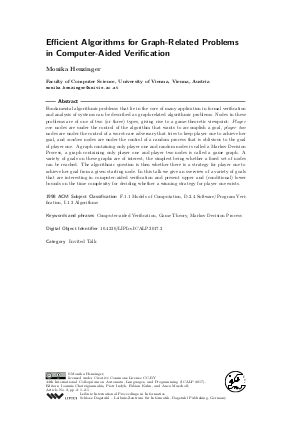Efficient Algorithms for Graph-Related Problems in Computer-Aided Verification (Invited Talk)
Author Monika Henzinger
-
Part of:
Volume:
44th International Colloquium on Automata, Languages, and Programming (ICALP 2017)
Part of: Series: Leibniz International Proceedings in Informatics (LIPIcs)
Part of: Conference: International Colloquium on Automata, Languages, and Programming (ICALP) - License:
 Creative Commons Attribution 3.0 Unported license
Creative Commons Attribution 3.0 Unported license
- Publication Date: 2017-07-07
File

PDF
LIPIcs.ICALP.2017.2.pdf
- Filesize: 215 kB
- 1 pages
Document Identifiers
Subject Classification
Keywords
- Computer-aided Verification
- Game Theory
- Markov Decision Process
Metrics
- Access Statistics
-
Total Accesses (updated on a weekly basis)
0PDF Downloads0Metadata Views
Abstract
Fundamental algorithmic problems that lie in the core of many application in formal verification and analysis of systems can be described as graph-related algorithmic problems. Nodes in these problems are of one of two (or three) types, giving rise to a game-theoretic viewpoint: Player one nodes are under the control of the algorithm that wants to accomplish a goal, player two nodes are under the control of a worst-case adversary that tries to keep player one to achieve her goal, and random nodes are under the control of a random process that is oblivious to the goal of player one. A graph containing only player one and random nodes is called a Markov Decision Process, a graph containing only player one and player two nodes is called a game graph. A variety of goals on these graphs are of interest, the simplest being whether a fixed set of nodes can be reached. The algorithmic question is then whether there is a strategy for player one to achieve her goal from a given starting node. In this talk we give an overview of a variety of goals that are interesting in computer-aided verification and present upper and (conditional) lower bounds on the time complexity for deciding whether a winning strategy for player one exists.
Cite As Get BibTex
Monika Henzinger. Efficient Algorithms for Graph-Related Problems in Computer-Aided Verification (Invited Talk). In 44th International Colloquium on Automata, Languages, and Programming (ICALP 2017). Leibniz International Proceedings in Informatics (LIPIcs), Volume 80, p. 2:1, Schloss Dagstuhl – Leibniz-Zentrum für Informatik (2017)
https://doi.org/10.4230/LIPIcs.ICALP.2017.2
BibTex
@InProceedings{henzinger:LIPIcs.ICALP.2017.2,
author = {Henzinger, Monika},
title = {{Efficient Algorithms for Graph-Related Problems in Computer-Aided Verification}},
booktitle = {44th International Colloquium on Automata, Languages, and Programming (ICALP 2017)},
pages = {2:1--2:1},
series = {Leibniz International Proceedings in Informatics (LIPIcs)},
ISBN = {978-3-95977-041-5},
ISSN = {1868-8969},
year = {2017},
volume = {80},
editor = {Chatzigiannakis, Ioannis and Indyk, Piotr and Kuhn, Fabian and Muscholl, Anca},
publisher = {Schloss Dagstuhl -- Leibniz-Zentrum f{\"u}r Informatik},
address = {Dagstuhl, Germany},
URL = {https://drops.dagstuhl.de/entities/document/10.4230/LIPIcs.ICALP.2017.2},
URN = {urn:nbn:de:0030-drops-75054},
doi = {10.4230/LIPIcs.ICALP.2017.2},
annote = {Keywords: Computer-aided Verification, Game Theory, Markov Decision Process}
}
